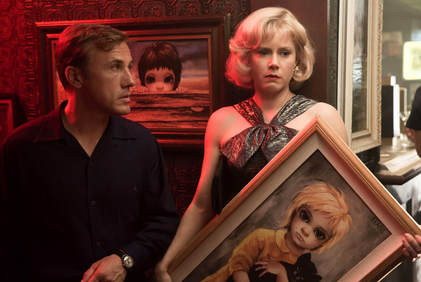C | A successful artist's husband takes all the credit for her work. Directed by Tim Burton Starring Amy Adams and Christoph Waltz Initial Review by Jon Kissel |

Once it becomes apparent that this is going to be a by-the-numbers biopic, the emphasis changes from the creative team of Burton and writers Scott Alexander and Larry Karaszewski to the leads. The film is on firmer ground here with two of my favorite working actors, but they can only do so much. This is a more conventional role than Any Adams usually takes. She seems to go for things with a higher degree of difficulty, and Big Eyes gives her Margaret one primary thing to play; being stuck in the shadow of her husband. Adams has no problem playing her nervousness or timidity, but she can do so much more. Despite his despicable actions, Waltz’s Walter is sadly the more compelling character, a man who had dreams that his mind couldn’t make manifest. I believe that motivation even as I know that very little the character says is true. His artistic motivation about postwar Europe is better than Margaret’s, who’s thought no deeper about her work than a banal line about the soul coming through the eyes. As opposed to what, the butthole? I think it’s easier to sympathize with a character that does anything over a character that does nothing, and that’s what’s happening with Walter and Margaret. Plus, she natters on about numerology. Get a character talking nonsense with a certainty that the subject’s interesting, and the door has been shut on my sympathy.
The domestic second-wave feminism angle has to be in Big Eyes, but it’s leaned on heavily at the expense of what else the film could have explored. By opening with a quote from Andy Warhol about the critical value of the big eyes paintings, the film is foregrounding a discussion of taste and who gets to decide what’s good or why people think something is good in the first place. I left Big Eyes without those questions having been answered. The critic character played by Terence Stamp is a fun melding of actor and role, as that’s pretty much how I imagine Stamp in real life, but like all directors who’ve had their relationship with the critical community sour, Burton can’t help but make the critic an effete elitist who hurts poor Margaret’s feelings. As far as why people are buying these paintings and prints, the film offers up little. The viewer is supposed to like Margaret, but it’s less clear if they’re supposed to admire her work. She’s prolific, but each painting is the same. Compared to the expressionist stuff that’s ruling the day, it’s the polar opposite, but both styles seem to have nothing to say. There has to some kind of middle between opaque and insulting paint splotches and mass-produced sentimentality. Is there going to an equivalent film about the overlooked female writers behind some terrible CBS sitcom or the marginalized executive at a Chinese factory that blasts out useless plastic tchotchkes? If the thing that’s being stolen from a person has so little value, why do I care that it’s being stolen?
Big Eyes isn’t a bad film, but it couldn’t be called a good one either. This is a perfect C, a meh, nothing terrible or amateurish or inspired or memorable. I have no idea what drew Burton to this project, and I was shocked to learn that Alexander and Karaszewski were in charge of the OJ Simpson FX miniseries, something I would’ve called some of the best written TV of 2016. That’s a work that can place its events in a specific time and find multiple resonances within them. Big Eyes can’t really do either. C
 RSS Feed
RSS Feed